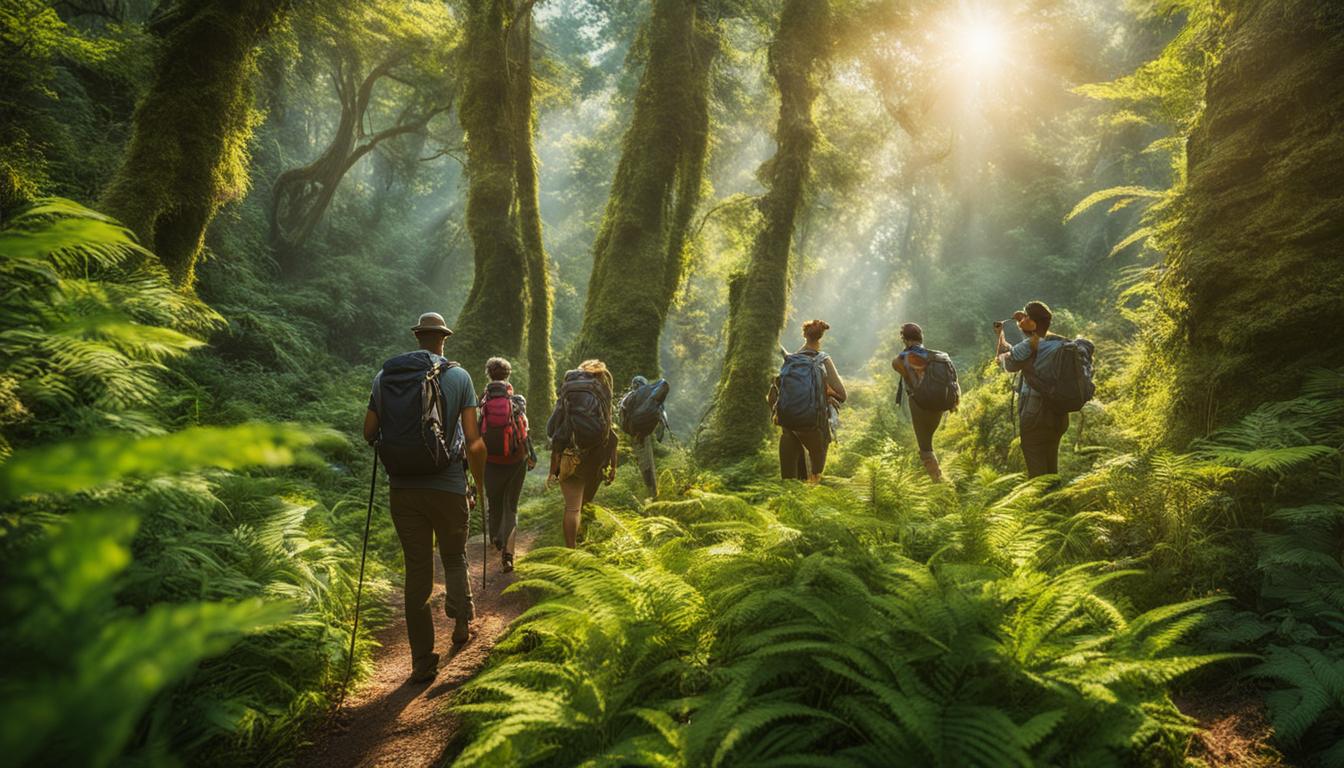Welcome to the world of environmental education, where curiosity meets the wonders of nature! By immersing yourself in the realm of nature education, you embark on a journey of discovery and connection to the environment. Environmental education plays a pivotal role in creating lifelong nature enthusiasts by fostering a deep appreciation for the natural world.
Through environmental education, you will gain knowledge, skills, and experiences that ignite your curiosity about the environment. It opens doors to explore the intricate web of life and understand the importance of preserving our ecosystems. From learning about biodiversity to understanding sustainability practices, you will develop a sense of responsibility towards environmental conservation.
Environmental education not only imparts essential knowledge but also encourages you to engage with nature hands-on. By stepping outside the classroom and immersing yourself in outdoor activities and adventures, you will experience the transformative power of nature firsthand. This experiential learning fosters a strong connection to the environment, shaping you into a lifelong nature enthusiast.
Join us as we delve into the world of environmental education, exploring the imperative role it plays in nurturing curiosity, fostering a connection to the environment, and cultivating lifelong nature enthusiasts.
Key Takeaways
- Environmental education ignites curiosity and fosters a deep connection to the natural world.
- Through hands-on experiences and outdoor adventures, lifelong nature enthusiasts are created.
- Environmental education imparts knowledge, skills, and a sense of responsibility for environmental conservation.
- It opens doors to explore biodiversity, sustainability, and the importance of preserving ecosystems.
- Experiential learning in nature plays a transformative role in shaping environmental attitudes and behaviors.
The Imperative Role of Environmental Education
Environmental education plays a crucial role in fostering lifelong learning and creating environmentally conscious individuals. It introduces learners to various environmental concepts, encourages critical thinking, and promotes a sense of stewardship towards the natural world. By equipping individuals with knowledge and skills related to the environment, environmental education empowers them to make informed decisions and take meaningful action to protect and preserve the planet.
Introducing Lifelong Learning through Environment Education
One of the key objectives of environmental education is to instill a passion for lifelong learning. By exposing individuals to a wide range of environmental topics and issues, it encourages curiosity and a thirst for knowledge about the natural world. Environmental education goes beyond classroom learning and extends into real-world experiences, such as field trips, outdoor activities, and hands-on experiments. These immersive learning experiences not only deepen understanding but also foster a lifelong connection to the environment.
Adapting Susan Sharma’s Approach for Online Environmental Communities
In the digital age, online platforms have emerged as powerful tools for environmental education. Susan Sharma, a prominent environmental educator, has pioneered the use of online environmental communities to engage learners and promote environmental awareness. By harnessing the power of technology, these communities provide a platform for individuals to connect, share ideas, and collaborate on environmental initiatives. Adapting Susan Sharma’s approach for online environmental communities allows educational methods to be tailored to the unique needs and preferences of a wider audience, fostering increased participation and expanding the reach of environmental education.
Outdoor Learning Adventures Education: Embracing Nature’s Classroom
In the realm of outdoor learning adventures education, nature serves as a dynamic classroom where individuals can engage in hands-on, experiential learning experiences. By venturing into the great outdoors and participating in a range of activities such as hiking, camping, and wildlife observation, learners are able to immerse themselves in nature’s classroom, fostering a deeper understanding of the environment and cultivating a personal connection to the natural world.
Experiential learning lies at the heart of outdoor education, offering a unique approach that goes beyond traditional methods of instruction. This form of learning encourages active exploration, discovery, and critical thinking, enabling individuals to develop a holistic understanding of ecological systems and the interconnections within them. By engaging all their senses, learners gain a profound appreciation for the intricate workings of nature and the importance of sustainable practices.
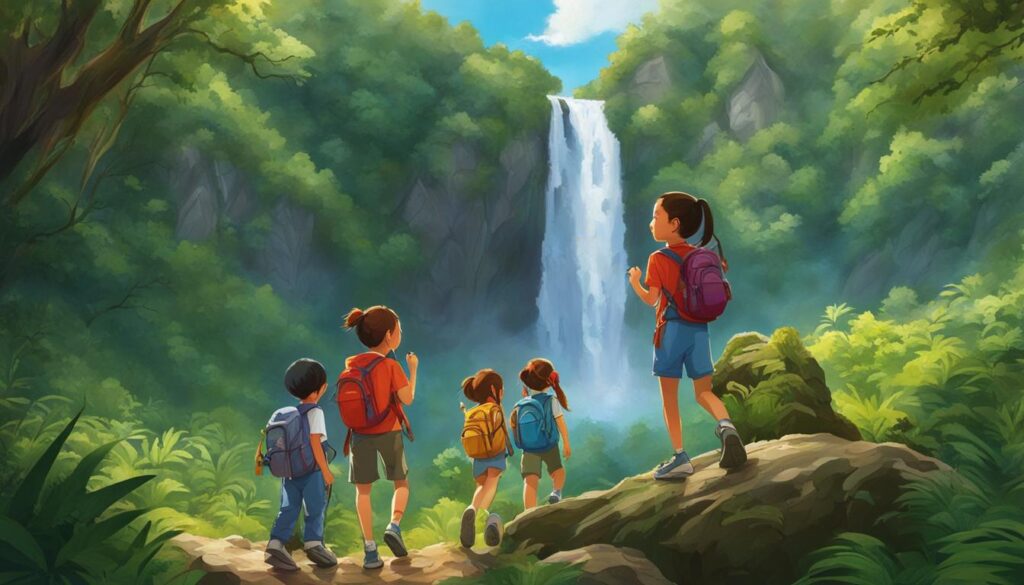
“Nature is not only the setting for outdoor learning adventures; it becomes the central character, guiding learners toward meaningful discoveries and providing endless opportunities for growth and development.”
Outdoor learning activities provide a rich and diverse learning experience, allowing individuals to witness firsthand the principles and processes that shape our natural world. Whether it’s observing the life cycles of plants and animals, studying the impact of weather patterns, or exploring the delicate balance of ecosystems, these immersive experiences enable learners to connect theoretical concepts with real-world applications.
Moreover, hands-on learning in nature encourages curiosity, creativity, and problem-solving skills while fostering an appreciation for the beauty and wonders of the natural environment. It offers a break from the confines of traditional classrooms, providing a refreshing and stimulating learning environment that sparks enthusiasm and engagement.
By embracing nature’s classroom, outdoor learning adventures education offers a transformative educational experience that instills a love for the outdoors, nurtures environmental stewardship, and equips individuals with the knowledge and skills needed to protect and preserve our planet for future generations.
Experiential Learning: Bridging Practical Experiences with Theoretical Knowledge
Experiential learning is a powerful approach that bridges the gap between practical experiences and theoretical knowledge. It provides learners with the opportunity to apply concepts learned in the classroom to real-world situations, enhancing their understanding and retention of the subject matter.
Connecting Theory with Nature-Based Education
In the context of nature-based education, experiential activities are particularly effective in connecting theoretical knowledge with practical experiences in the natural environment. By immersing individuals in hands-on learning opportunities, such as field trips, outdoor experiments, and interactive exercises, learners can witness the principles and concepts they have studied come to life.
This connection between theory and nature-based education has transformative effects. It not only deepens their understanding of ecological systems but also fosters a genuine appreciation and respect for the environment. Through experiential learning, individuals develop a personal connection with nature, making them more likely to engage in sustainable practices, advocate for environmental conservation, and become lifelong stewards of the planet.
Cultivating Insight and Stakeholder Involvement through Experiential Activities
Experiential activities in nature-based education not only provide practical experiences but also cultivate insight and foster stakeholder involvement. By actively engaging learners in hands-on projects, research, and problem-solving activities, they develop a deeper understanding of the complexities and challenges associated with environmental issues.
Furthermore, these experiential activities provide opportunities for stakeholder involvement. Whether it’s collaborating with local communities, government agencies, or environmental organizations, learners can actively contribute to environmental conservation efforts. This involvement not only connects them with real-world stakeholders but also empowers them to make a meaningful impact on the environment and inspire others to do the same.
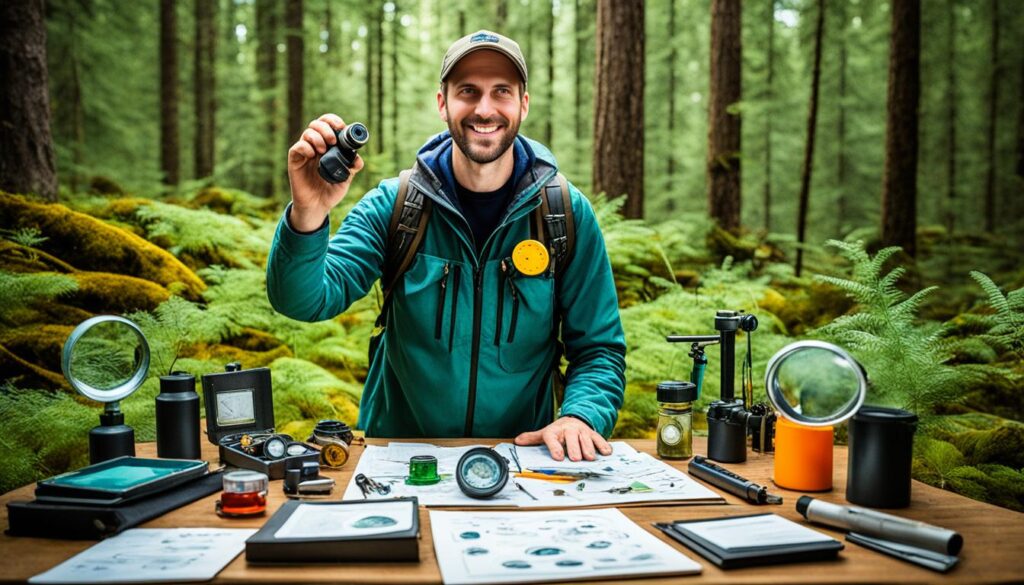
Through experiential learning, nature-based education becomes a catalyst for personal growth, environmental awareness, and stakeholder engagement. By bridging theoretical knowledge with practical experiences in the natural world, individuals gain a deeper understanding of ecological systems, develop a strong connection to nature, and actively participate in environmental conservation efforts.
Environmental Education Programs: Nurturing Curiosity and Responsibility
Environmental education programs play a crucial role in nurturing curiosity and fostering a sense of responsibility towards the environment. These programs provide structured learning opportunities that encourage individuals to explore nature, develop an understanding of ecological systems, and take actions to protect and conserve the environment.
By instilling a sense of responsibility from an early age, environmental education programs aim to create a generation of environmentally conscious individuals who value and respect the natural world.
Through nature exploration and outdoor education programs, participants have the opportunity to engage with the environment firsthand, deepening their understanding of ecological concepts and fostering a lifelong connection to nature. These programs offer a dynamic and interactive learning environment where individuals can develop critical thinking skills, problem-solving abilities, and a deep appreciation for the multitude of benefits that nature provides.
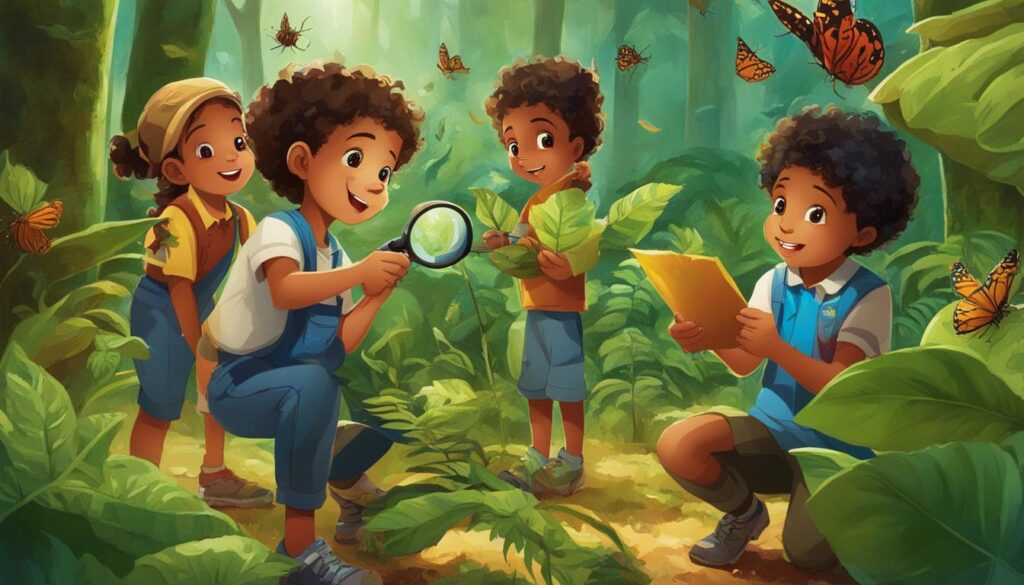
Lessons from the Wild: Outdoor Education for Kids
Engaging Youth with Interactive Outdoor Education Activities
Outdoor education for kids offers valuable lessons and experiences that foster their connection to nature and environmental understanding. By engaging youth in interactive outdoor education activities, such as nature walks, hands-on experiments, and wildlife encounters, children develop a profound appreciation for the natural world. These outdoor learning experiences have a lasting impact on young minds, shaping their environmental attitudes and behaviors for years to come.
The Influence of Outdoor Learning Experiences on Young Minds
Outdoor learning experiences have a powerful influence on shaping the minds of children. By immersing themselves in the beauty and wonder of the natural world, kids develop a deep sense of curiosity and appreciation for the environment. Through interactive outdoor education activities, children not only learn about nature but also develop important life skills such as problem-solving, teamwork, and critical thinking. These experiences create a strong foundation for their future environmental stewardship.
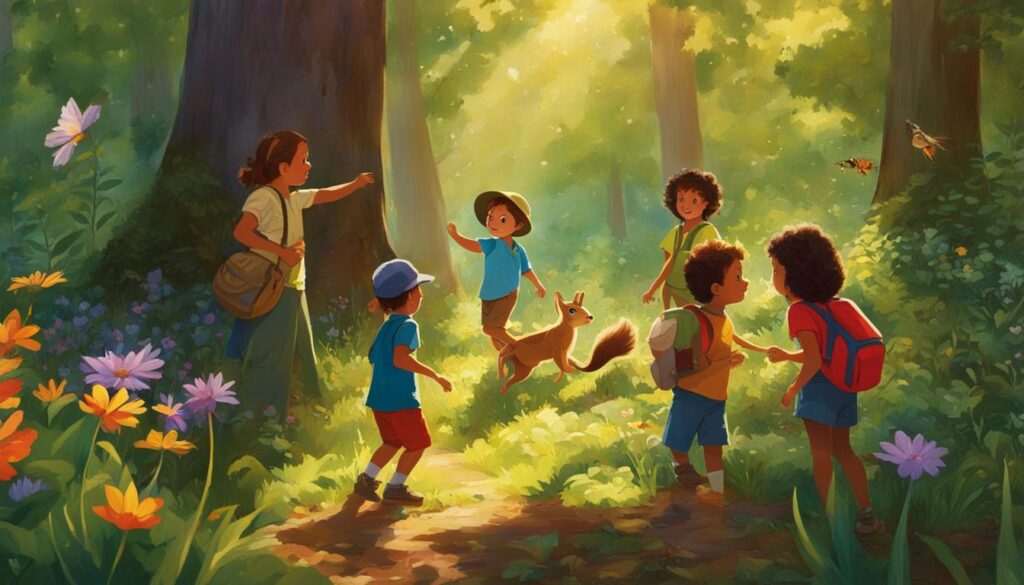
| Benefits of Outdoor Education for Kids | Examples of Interactive Outdoor Education Activities |
|---|---|
|
|
Transforming Learning Landscapes: The Benefits of an Outdoor Education Curriculum
Incorporating outdoor education into the curriculum can transform learning landscapes and provide numerous benefits for students. By integrating nature-based learning experiences into traditional classroom settings, students gain diverse perspectives, develop critical thinking skills, and foster a deep connection to the natural world. Outdoor education offers a holistic approach to learning, addressing cognitive, emotional, and physical development, and promoting overall well-being.
Outdoor education curriculum encourages students to step outside the confines of the four walls and engage with the natural environment. Through hands-on activities and direct interaction with nature, students have the opportunity to apply theoretical knowledge to real-world scenarios. This practical approach cultivates deeper understanding and enhances problem-solving abilities.
Nature-based learning experiences provide a unique platform for students to explore their surroundings, fostering curiosity and a sense of wonder. By immersing themselves in the natural world, students develop a heightened appreciation for biodiversity and ecological systems. They learn to value the importance of conservation and sustainable practices, becoming environmentally conscious individuals.
“The curriculum is so much necessary raw material, but warmth is the vital element for the growing plant and for the soul of the child.” – Carl Jung
The benefits of an outdoor education curriculum extend beyond academic achievements. Spending time in nature has been linked to improved mental health and well-being. Studies have shown that exposure to green spaces and outdoor activities can reduce stress, enhance creativity, and increase overall happiness. By incorporating outdoor learning experiences, schools can contribute to the holistic development of their students.
Furthermore, outdoor education promotes physical activity and a healthy lifestyle. Students engage in physical challenges, such as hiking, rock climbing, and team-building exercises, fostering physical fitness and motor skills. This integration of physical activity with academic learning helps combat sedentary lifestyles and encourages an active approach to education.
| Benefits of Outdoor Education Curriculum | Description |
|---|---|
| Enhanced critical thinking skills | Nature-based learning allows students to analyze and solve problems in real-world contexts, developing their critical thinking abilities. |
| Environmental stewardship | By connecting with nature, students develop a sense of responsibility and become advocates for the environment and sustainable practices. |
| Improved mental health and well-being | Spending time outdoors reduces stress, boosts creativity, and contributes to overall mental well-being. |
| Physical fitness and motor skills | Engaging in outdoor activities promotes physical fitness, coordination, and the development of motor skills. |
| Holistic development | Outdoor education addresses cognitive, emotional, and physical development, nurturing well-rounded individuals. |
In conclusion, an outdoor education curriculum offers transformative learning experiences and a myriad of benefits for students. By incorporating nature-based learning into traditional classroom settings, schools can create dynamic learning environments, foster a deep connection to the natural world, and promote holistic development. The integration of outdoor education is vital in nurturing environmentally conscious individuals who will play a pivotal role in creating a sustainable future.
Innovative Outdoor Education Resources: Enhancing Traditional Teaching Methods
Enhancing traditional teaching methods is essential in providing effective nature education. Innovative outdoor education resources play a crucial role in engaging students and creating immersive learning experiences. By incorporating these resources, educators can stimulate curiosity, foster a deeper connection to nature, and inspire a love for the environment.
Selecting the Right Tools and Resources for Effective Nature Education
When it comes to outdoor education, selecting the right tools and resources is key to creating impactful learning experiences. Educators can choose from a variety of resources that align with their teaching goals and student needs. Here are some examples of outdoor education resources:
- Field guides: These comprehensive guides provide detailed information about plants, animals, and ecosystems, allowing students to identify and learn about the natural world.
- Interactive apps: Technology can enhance outdoor education by offering interactive app experiences that facilitate exploration, identification, and learning. These apps can provide students with virtual guides, quizzes, and augmented reality features.
- Educational materials: Workbooks, activity sheets, and lesson plans specifically designed for outdoor education can enhance engagement and understanding.
By carefully selecting and utilizing these resources, educators can create dynamic and enriching nature education experiences for their students.
Integrating Technology and Outdoor Education: A Synergetic Approach
The integration of technology in outdoor education can be a powerful and synergetic approach. Technology bridges the gap between the classroom and the natural world, offering unique opportunities for exploration and engagement.
One way to integrate technology is through the use of mobile devices or tablets. Students can use these devices to document their outdoor experiences, capture images and videos, and conduct real-time research. Technology also enables students to access online resources, interactive maps, and informational websites that enhance their understanding of the environment.
Furthermore, technology can facilitate connections and collaborations between students and experts in the field. Virtual field trips, video conferences, and online forums provide opportunities for students to learn directly from professionals and engage in meaningful discussions about environmental issues.
By integrating technology into outdoor education, educators can harness the benefits of both digital tools and hands-on learning experiences, creating a synergistic approach that maximizes student engagement and learning outcomes.
Conclusion
In conclusion, the journey towards becoming lifelong nature enthusiasts begins with environmental education. It is through this educational framework that individuals develop a deep connection and appreciation for the natural world. By imparting knowledge, skills, and experiences related to the environment, environmental education fosters a sense of responsibility and ignites a passion for protecting and preserving our planet.
Reflecting on this transformative journey, individuals realize the impact of environmental education on shaping their attitudes and actions. They understand the importance of sustainable practices, conservation efforts, and the interconnectedness of all living beings. Environmental education equips individuals with the tools they need to make informed decisions and take meaningful action to safeguard the environment.
Furthermore, as environmental education continues to evolve, it adapts to new technologies and perspectives. The integration of digital tools, online platforms, and innovative resources enhances the effectiveness of nature education. This continual evolution holds promise for the future, as it enables environmental education to reach even wider audiences and contribute to the creation of a more sustainable and environmentally conscious society.
FAQ
What is the role of environmental education in creating lifelong nature enthusiasts?
Environmental education plays a crucial role in cultivating lifelong nature enthusiasts by providing individuals with knowledge, skills, and experiences related to the environment, fostering a deep connection and appreciation for nature.
How does environmental education contribute to lifelong learning?
Environmental education introduces learners to various environmental concepts, encourages critical thinking, and promotes a sense of stewardship towards the natural world, fostering a lifelong learning journey in relation to environmental issues.
Can online platforms be used for environmental education?
Yes, online platforms, such as environmental communities, provide opportunities to adapt educational approaches and engage a wider audience in environmental awareness and action.
What is outdoor learning adventures education?
Outdoor learning adventures education embraces the concept of nature’s classroom, where individuals engage in hands-on, experiential learning experiences in the outdoors through activities such as hiking, camping, and wildlife observation.
How does experiential learning contribute to nature-based education?
Experiential learning bridges the gap between practical experiences and theoretical knowledge by providing individuals with opportunities to apply concepts learned in the classroom to real-world situations, fostering a deeper understanding and appreciation for the natural environment.
What are the benefits of environmental education programs?
Environmental education programs nurture curiosity, foster a sense of responsibility towards the environment, provide structured learning opportunities to explore nature, develop an understanding of ecological systems, and encourage individuals to take actions for environmental protection and conservation.
How does outdoor education for children foster their connection to nature?
Outdoor education for children offers valuable lessons and experiences through interactive activities such as nature walks, hands-on experiments, and wildlife encounters, which develop a profound appreciation for the natural world and shape their environmental attitudes from an early age.
How does outdoor education benefit students?
By integrating nature-based learning experiences into the curriculum, outdoor education provides students with diverse perspectives, develops critical thinking skills, fosters a deep connection to the natural world, and promotes overall well-being.
How can innovative outdoor education resources enhance traditional teaching methods?
Innovative outdoor education resources, such as field guides, interactive apps, and educational materials, engage students in nature education. Integrating technology into outdoor education can create a synergetic approach, combining digital tools and hands-on learning experiences.
Source Links
- https://indianwildlifeclub.com/ResearchPapers/Environment-Education-as-a-Process-of-Life-Long-Learning.pdf
- https://education.gov.scot/media/rvdfwele/learning-outdoors.pdf
- https://researchprofiles.herts.ac.uk/files/25225690/EER_pre_publication_version.pdf

